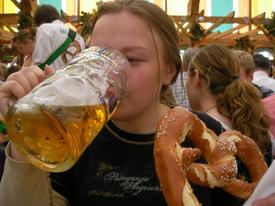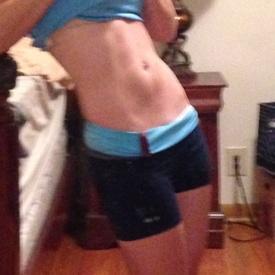How can I get back on track without having to starve myself?
Options

jaina08
Posts: 561 Member
I was able to lose 6 lbs in 3 weeks by only eating 1000-1200 calories a day. I was basically starving myself. It's been a whole month that I have been eating much more (probably around 1800-2000 calories a day) which is such a drastic change which made me gain the 6 lbs back. I was 122 lbs and now I'm back to 128 lbs. My goal is to reach 120 lbs but it's so difficult. I exercise 6 days a week. I do cardio and lift weights. How can I get motivated to eat right again but not starve myself at the same time?
0
Replies
-
bump0
-
Not sure what your calorie goal is but regardless, try to eat filling foods like fiber and protein and lots of vegies. Drink lots of water. Limit your sodium and sugars. Fruits are good but stick to the basic food pyramid. A good thing to stick to is eating every three hours. Try splitting your day up like this. THen you wont feel so deprived. IF you exercise that much make sure you eat what your allowed is so your body wont turn your calories into fat for storage.0
-
Are you following MFP's guidelines based on your current weight, goal weight, amount of exercise, net calories?0
-
Check out eat more 2 weigh less... its more about keeping lean muscle mass.. losing body fat...
 I eat.. and lose inches slowly I am also doing stronglifts... my body has changed
I eat.. and lose inches slowly I am also doing stronglifts... my body has changed  0
0 -
What size are you and what makes you think you are supposed to be 120lb?
If you train a lot and have muscle, than you will weigh more. And look better.0 -
What size are you and what makes you think you are supposed to be 120lb?
If you train a lot and have muscle, than you will weigh more. And look better.
I'm 5'1. I've been lifting for a month now which might be why I'm also gaining weight?? I used to only do cardio.0 -
Did you measure yourself by any chance? becasue sometime you gain weight , water retention, muscle gain, time of the month there's all sorts of reason, but your measurements stay the same...
I haven't lost much weight but my measurements have decreased quiet a bit over the past week since begining a new plan of action... Hoping to stay on this track for a while 0
0 -
If you've started lifting recently your muscles are likely restocking the glycogen/water needed for muscle repair. Give it some time and I agree with the person above try measuring yourself. Sometimes the scale doesn't move, or moves up instead of down, but measurements can show a positive change.0
-
LOL. Yes, muscle weighs more than fat. Have someone do a body composition analysis and find out how much body fat you really do have...What size are you and what makes you think you are supposed to be 120lb?
If you train a lot and have muscle, than you will weigh more. And look better.
I'm 5'1. I've been lifting for a month now which might be why I'm also gaining weight?? I used to only do cardio.0 -
It sounds like your body is going into starvation mode and the weight loss may be just water weight.
You need to eat otherwise your body goes into starvation mode and holds on to fat because it doesn't know when the next meal is coming. As long as you eat regularly your body will go on as normal, which will help loosing weight.
Also, being a certain weight isn't necissarily the best goal because muscle weighs more than fat you may weigh more but are actually quite healthy. For me, the goal is loss of fat rather than an exact weight since I am putting on muscle as well.
Since your are very active you are going to need more calories anyway. So you need to find out your base metabolism (how much your body needs to run just by resting) plus how much you need for some of your extra activity (not all because then you wouldn't lose anything).
For me, it was about learning when I needed to eat versus when I wanted to eat. Also, keeping portion sizes down. I find it's better to have 6 meals (2 big ones for breakfast and lunch, 3 snack sizes in between, and 1 for dinner) spaced out as opposed to just 3 a day.
But everyone is different of course : P
It's also good to have realistic goals and expectations so not to sabotage yourself. You may have lost 6lbs but put on 3lbs of muscle (which is good). So you are in fact healthier for it.
Best advice: keep at it (and maybe talk to the pros) 0
0 -
LOL. Yes, muscle weighs more than fat. Have someone do a body composition analysis and find out how much body fat you really do have...
Agree with a slight modification to the wording (if I may): A pound of muscle takes up less space than a pound of fat. That's where the measurements become important! You could weigh the same or more but in fact you are leaner than before.0 -
Did you measure yourself by any chance? becasue sometime you gain weight , water retention, muscle gain, time of the month there's all sorts of reason, but your measurements stay the same...
I haven't lost much weight but my measurements have decreased quiet a bit over the past week since begining a new plan of action... Hoping to stay on this track for a while
I did measure myself, no loss or gain in inches...0 -
It sounds like your body is going into starvation mode and the weight loss may be just water weight.
You need to eat otherwise your body goes into starvation mode and holds on to fat because it doesn't know when the next meal is coming. As long as you eat regularly your body will go on as normal, which will help loosing weight.
Also, being a certain weight isn't necissarily the best goal because muscle weighs more than fat you may weigh more but are actually quite healthy. For me, the goal is loss of fat rather than an exact weight since I am putting on muscle as well.
Since your are very active you are going to need more calories anyway. So you need to find out your base metabolism (how much your body needs to run just by resting) plus how much you need for some of your extra activity (not all because then you wouldn't lose anything).
For me, it was about learning when I needed to eat versus when I wanted to eat. Also, keeping portion sizes down. I find it's better to have 6 meals (2 big ones for breakfast and lunch, 3 snack sizes in between, and 1 for dinner) spaced out as opposed to just 3 a day.
But everyone is different of course : P
It's also good to have realistic goals and expectations so not to sabotage yourself. You may have lost 6lbs but put on 3lbs of muscle (which is good). So you are in fact healthier for it.
Best advice: keep at it (and maybe talk to the pros)
So when I was eating very little calories (1000-1200) I didn't really lose real weight? Just water weight? And now that I've been eating a lot more did I really gain fat? Or just the water weight back?0 -
A starvation diet causes glycogen depletion (aka water weight loss.) Eating back at normal levels causes your body to replenish glycogen stores (aka water weight gain.) The same thing happens when cycling rapidly between high and low carb diets, low carb loses water weight, high carb regains it. Calculate your needs, and stick to them. Keep your deficit small, as you have very little weight to lose. BE PATIENT.
As for gaining muscle, sorry, that's not what is happening. You cannot put on significant muscle in a calorie deficit, especially in such a short time frame.0 -
As a woman you shouldn't go below 1200 net calories on a daily basis. If you have eaten 1200 calories and then exercise to burn off 100 calories you need to eat that 100 back so that the net calorie intake (Calories Eaten - Calories Burned) is at least 1200 calories. (MFP can help you if you log your exercise.)
You should be also eating more often and, if you are doing a lot of exercise, you may want to bump up your protein intake and even it out throughout the day so that you are getting approximately 1/6 of your daily protein intake with each meal/snack. Lower your sodium intake and increase your water.
You're going to get there, you just need to adjust things a little bit more.0 -
Try eating between your BMR and your TDEE. Problem solved.0
-
The first paragraph is good advice. The second paragraph isn't. Meal timing and nutrient timing have no effect on weight loss. Sodium is irrelevant, and increasing water is unnecessary, and will actually just increase water weight.As a woman you shouldn't go below 1200 net calories on a daily basis. If you have eaten 1200 calories and then exercise to burn off 100 calories you need to eat that 100 back so that the net calorie intake (Calories Eaten - Calories Burned) is at least 1200 calories. (MFP can help you if you log your exercise.)
You should be also eating more often and, if you are doing a lot of exercise, you may want to bump up your protein intake and even it out throughout the day so that you are getting approximately 1/6 of your daily protein intake with each meal/snack. Lower your sodium intake and increase your water.
You're going to get there, you just need to adjust things a little bit more.0 -
A starvation diet causes glycogen depletion (aka water weight loss.) Eating back at normal levels causes your body to replenish glycogen stores (aka water weight gain.) The same thing happens when cycling rapidly between high and low carb diets, low carb loses water weight, high carb regains it. Calculate your needs, and stick to them. Keep your deficit small, as you have very little weight to lose. BE PATIENT.
As for gaining muscle, sorry, that's not what is happening. You cannot put on significant muscle in a calorie deficit, especially in such a short time frame.
this
/endthread0 -
In short, yes you did lose weight but figuring out from where is tricky when relying only on a scale.
The thing about weighing yourself on a scale is that it includes everything - bones, muscle, fat, water, partly digested food...the lot. So it can be tricky to say where the loss is.
I have a scale that also measures water and body fat, which I find more helpful.
Losing 6lbs in 3 weeks isn't too bad but it could be losing weight too fast. It depends on your body though as some people (usually with lots of muscle beforehand) can lose weight super fast. However, you don't want to stress your body out as it needs time to adjust, which is why losing 1lb a week may be more realistic.
The weight you put back on could very well be muscle (especially since you go to the gym so regularly), which is a good thing.
I know it can be discouraging to see your weight go up after so much hard work, but you need to keep in mind that it could be adding muscle on to your body. So don't take it too badly. I have been advised before that putting on 1lb of muscle per week is realistic.
Also, when do you weigh yourself? You should do it in the morning the same time every week. If you do it during the day it will include food you've eaten or if you do it after a work out it will include all the water you (should) be drinking. Weigh yourself in the morning (after going to the bathroom if you need to - gross!) as your body should be empty (after 8 hours of no food or drinking).
One of the best ways to determine if your putting on more or less fat is to go get zapped (the bioelectrical impedance analysis). This sends a small electrical signal throughout your body and measures the resistance from different materials in your body. It gives a reasonable measure of body fat percentage.
Most gyms offer this service, or you can buy one yourself.
Note too that women usually need more fat than men because of our differences in biology. Not me that thinks this, mother nature does
I'd also avoid using BMI as a measure of progress, it can be a good starting point, but it measures all the bits of your body whereas the problem with people being overweight is too much fat.
A 6-foot 250lb person with 40% body fat is unhealthy, a 6-foot 250lb person with 5% body fat is probably a lean, muscly athlete. But the BMI would be the same. I'm 6'1'' and used to be 235lbs with 30%+ body fat, I'm now 200lbs with 15% (much healthier), although I'm still considered overweight using BMI.
Finally, when you change your caloric intake significantly, your body gets confused. Like I mentioned before, it can go into starvation mode and hold on to the food it gets (which increases your weight).
If you want to reduce your calories do it slowly rather than in a dramatic fashion. But reducing calories isn't always the best thing if you are very active - you need to keep the machine running.
So eating 2000 calories and burning 500 calories means your body is running on 1500, and if it needs 2000 just to keep running it could go into starvation mode - holding on to food and fat longer than you want, which makes losing weight more difficult for you.
I need about 2500 a day doing nothing, but to loose 1lb a week I need 2000. I usually burn 400 in exercise a day. So if I eat 2000 and do 400 exercise my body is running on 1600, 900 under what I need! It's better (and healthier) to eat 2400 - slightly less than what I need - and burn 400. Then I'm right where I need to be.
This week I've lost 2lbs and .4% body fat and have increased my weights at the gym, which suggests the weight lost is fat.
For that week I needed 18,200 calories. I ate 17,201 and exercised 3,035 for a deficit of 4,034 (my target is 3,780). That is slightly more than what I expected, but next week it might slow down or I may need to eat some more to not lose weight so fast.
Starving yourself isn't the way to go because it is unhealthy and stresses your body out. Remember, this is a lifestyle change, so it may take a while to get into the habit.
Hope this helps, and keep at it!0 -
So much misinformation and pseudo science in these replies it makes my head hurt.0
-
Another thought....maybe you aren't really eating 1800-2000. You should not gain weight at that amount with all of the exercise you're doing. How positive are you on portion size and whatnot? Do you weigh and measure your food, or just eyeball/guess?0
-
Your body is inert and bouncy. Sometimes it's hard to get it moving in any direction. Then you give it a huge push and it bounces further than you wanted it to. And it may bounce back right away. or not.
Anyway that's me trying to paint a picture of how your body weight reacts to what you eat.
Basically don't make any drastic changes. Don't go from eating 2000 to 1200 or anything like that. Like you want to eat 200 calories less? That's fine. Monitor it for 2 or 3 weeks. Then change by another 200. Monitor for a few weeks again. Only if you make small changes and you monitor will you really become aware of how your body reacts to small changes. Don't go and make huge changes.
IF you're patient enough to monitor, you will find a reasonable level of calories that doesn't feel like torture but still allows you to GRADUALLY lose some weight. Shoot for 1lbs per week. Then when you get near your ideal weight, go past it a little bit. Because when you start eating more you will put on some water weight or glycogen stores or whatever. So go lower by 2-3 pounds under your ideal weight before you re-adjust your calories up. Readjust should be slowly again, by 200 calories every step.
Only if you take things slow can you measure and learn. If you keep changing how you eat, well how are you going to know what is going on?0
This discussion has been closed.
Categories
- All Categories
- 1.4M Health, Wellness and Goals
- 394.3K Introduce Yourself
- 44.1K Getting Started
- 260.5K Health and Weight Loss
- 176.3K Food and Nutrition
- 47.5K Recipes
- 232.7K Fitness and Exercise
- 449 Sleep, Mindfulness and Overall Wellness
- 6.5K Goal: Maintaining Weight
- 8.6K Goal: Gaining Weight and Body Building
- 153.3K Motivation and Support
- 8.3K Challenges
- 1.3K Debate Club
- 96.4K Chit-Chat
- 2.5K Fun and Games
- 4K MyFitnessPal Information
- 16 News and Announcements
- 18 MyFitnessPal Academy
- 1.2K Feature Suggestions and Ideas
- 3K MyFitnessPal Tech Support Questions













